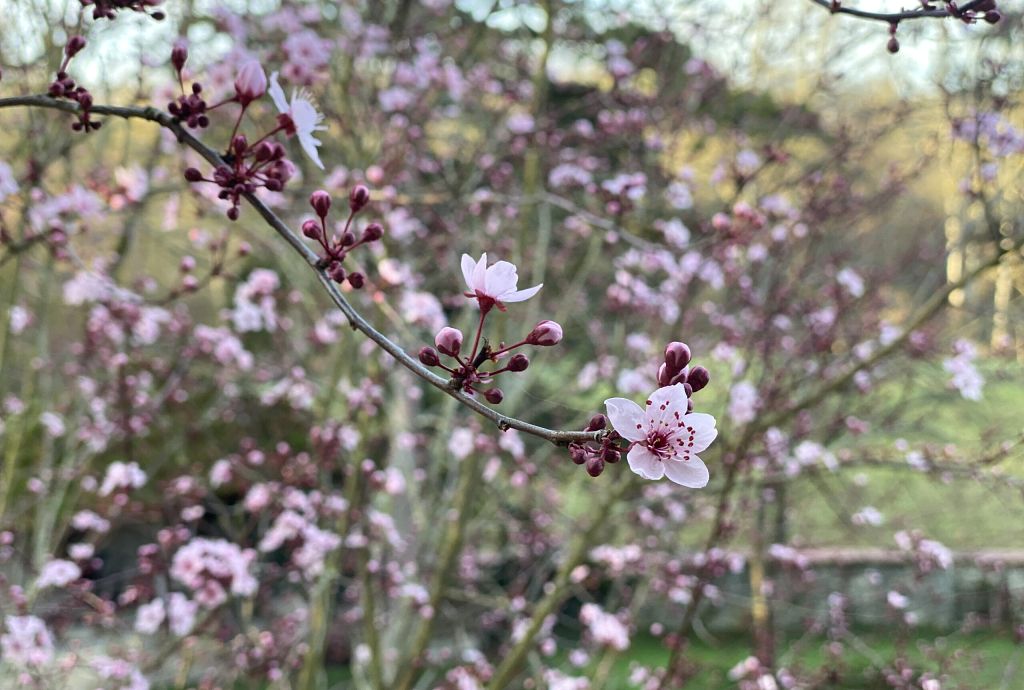The hope of inner work to heal our aching world

I suppose it’s not surprising that on a day like today my thoughts turn not only to anguish in Ukraine in the present, but also to the horrors of the second world war, which has left scars all across my current homeland of France. As bombs fall on the terrified citizens of Kiev, I imagine the world of the inhabitants of this house in the 1940s. Two Italians lived here then: a Jewish man and a Catholic woman. Before the war they enjoyed the fruits of this part of the world: he was an artist and painted dinner parties in the salon, swimming in the river, ripe fruit near an open window in the sunshine. When war came, he raced back to Italy to see if he could save any of his family there. He could not. And neither could he return for several years. She stayed in the house here as it was commandeered by Nazis for a time. I cannot imagine the terror and grief either of them experienced.
And now it’s now, and across Ukraine, there are those who are terrified, grieving, fleeing. And right now there are those in Russia horrified and ashamed at what is being done in their name.
It is times like now when my work at the intersection of adult development, complexity, and leadership can seem out of touch with what is needed right now: I am not helping with the peacekeeping efforts, nor am I on the ground to offer support, food, shelter, or blankets. I am not a doctor who can heal the injured nor a spy that could dissemble my way into knowledge that could stem attacks and save lives.
But actually, I am increasingly aware that so much of what ails us humans on this fragile and beautiful planet is that we have not grown our perspectives to be as voluminous as our power; we have not evolved ourselves and our impulses as we have evolved the ways we can kill one another and our natural world. I do not claim to understand what animates Putin and his choices. In truth, I cannot even begin to imagine. But I do believe that violence is often the way people discharge pain and longing they cannot face another way. And profoundly powerful people do that at a profoundly painful scale.
We would not give a chef’s knife to a baby—she would not know what to do with it and would likely hurt herself or others. We wait until she’s older, until she can understand and handle the responsibility and power of wielding the knife. Yet today we all have power we can barely contain: even here in this laptop I have the power to reach out and do immeasurable harm, and there are plenty of folks who will open their laptops today and hurt others.
We all need to hone our perspective taking ability—to understand that the colleague who frustrates us is a hero in his own story, that the family member who voted in some inexplicable way has her own internally coherent ways of seeing the world that come from her experience. We need to understand the way our own pain and trauma are like mud on the windows of our experience, tainting everything we see out there. And we need to work on the ways we are with one another, understanding that love and connection are our natural state and that fear and protection are like rocks in the river of that flow, strangling the stream or twisting the shape of us.
I am not bold enough to claim that if Putin had done his inner work, we would not be in this horrific situation. I don’t know the man. But I am bold enough to say that if more of us were doing this inner work, this intentional evolution of ourselves to keep up with the astonishingly complex and dangerous world we live in, we would create less pain and difficulty. We would love each other better. We would work harder to create a just world. And we might even slow the heating of our planet.
I am lucky to live in a house with deep history that connects me forward and back through time. I am lucky for the buds on the trees that remind me that spring arrives without my even putting it on my to do list. I am grateful for the changes in the world that have brought me to this beautiful place at this astonishing time in human history. And I want to do my part to help our troubled world. Right now, that is with donations of spirit and money to those who are unjustly under fire everywhere. It is with my own inner work to learn to love better, to handle power with more grace and less harm. And it is with my work helping us intentionally grow ourselves to be able to handle all the promise and peril that this time has brought us.
Jennifer, thank you for naming the experience that many of us are having right now. One question that I think is worth adding to the mix: who are the Putins in the organizations where we work? Who are the opportunistic, egocentric folks who use unilateral power moves not just once but over the course of years to develop power bases and even high executive positions—and who are not receiving our support? How well-equipped are the leaders we support to deal with these Putins? What more can we do to help such leaders in finding skillful means to hold the organizational Putins in check, if not somehow open spaces for them to grow? My experience suggests to me this call for an even wider repertoire of stories about organizational life and growth edges.